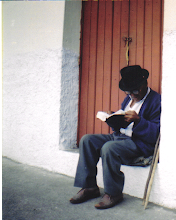I sometimes wonder why we are so quick to point out how people are different from ourselves. Maybe it's because if we were to take the time to list our similarities, it would take too long. But for centuries, we have used our differences as bricks to build barriers around ourselves to protect "us" from "others." Most of us began constructing our barriers as children. Some of us began building upon the already high barriers of our parents.
I've had my own barriers. But some of the most satisfying experiences I've had were when my barriers tumbled down:
As a citizen of the United States, it was easy for me to separate myself from citizens of other nations. The privileges and opportunities here have provided amazing opportunities for education and economic comfort. And it was easy to consider myself superior to non-Americans.
But in Ecuador, that barrier was quick to fall. After I had served as a missionary for four months in a remote Andean Indian village, my companion and I visited a family which belonged to the Church of Jesus Christ of Latter-day Saints to encourage them to share the message of our Church with their friends. Their home was a flat-roofed, cement shack with three rooms. They had an old television and used their bed as a couch from which they could watch it. They were more fortunate than most because their floor was cement and not dirt.
The mother of the family had served as a missionary herself, and she and I began exchanging missionary experiences. It was obvious how deeply she loved Jesus Christ and how important her time as a missionary was to her.
And then it hit me. The only real difference between her and me was that she had been born in Ecuador and I in the United States. And that difference didn't matter at all. If anything, I bore a great responsibility as a United States citizen to extend the privileges and opportunities of our nation to others.
I built another barrier in High School when the Southern Baptist Convention decided to hold its annual convention in Salt Lake City with the express purpose of making all Mormons Christians. It infuriated me. I had grown up singing songs like "Jesus Wants Me for a Sunbeam," "I Feel My Savior's Love," "I'm Trying to Be Like Jesus," "I Believe in Christ," "I Know that My Redeemer Lives," "Redeemer of Israel," and "Jesus, the Very Thought of Thee." My bedtime stories were about Jesus' ministry in Palestine. And I had studied the New Testament personally, in Sunday School, and in Seminary (a program for high-school-aged students). What was more, I had read the Book of Mormon, which teaches and testifies of Jesus Christ as the Son of God and only means of salvation, many times.
All I could think was, "How dare they tell me I'm not a Christian?" And I dismissed all Baptists as modern-day Pharisees.
Little did I know that I would attend a Baptist-sponsored law school. But even after we decided to come to Baylor, I expected that I would need to shield myself behind the barrier I built in High School.
But during orientation, my barrier began coming down. As I sat in a lecture about how to analyze cases by Professor Osler, a devout Baptist, he asked me to stand. He asked me about a few details of a murder case from Arizona. Then he talked about our legal system. And he asked if Ecuador's legal system functioned like the United States'.
I was immediately impressed that a professor doing an orientation lecture would take the time to read almost one hundred profiles so he could personalize a one-hour lesson. And most of those students wouldn't take one of Professor Osler's classes until they entered practice court.
A little over one year later, I began taking the criminal law classes Professor Osler teaches, and I started getting to know him better. He also made a presentation to the Christian Legal Society about his "faith journey." Even though I'm not a member of the CLS, I attended. He spoke of his childhood and the night while working as an itinerant crop harvester in Washington state when he humbled himself and pleaded for God to guide his life. I left that meeting knowing that Professor Osler loves Jesus Christ.
I've had the privilege to take other classes with Professor Osler, including one which he team taught with two Baptist ministers. As I listened to Professor Osler and those ministers, I often felt as if I were sitting in a Mormon Sunday School class. I recognized that Baptists and Mormons share so much when it comes to devotion to Jesus, loving others, and forgiving others. It was wonderful to be instructed by those three humble followers of Jesus Christ.
And my barrier crumbled.
Now, Professor Osler, someone whom I would have dismissed as a modern day Pharisee, has become my mentor, friend, and brother in the faith of Jesus Christ.
It's true that differences will always distinguish "us" from "others." But we can't let those differences divide us. So let's allow our commonalities to demolish our barriers, or at least bridge them. Otherwise, we will lose countless opportunities to learn and grow. And we will never know how many friends we could have had.

3 comments:
After reading that, all I can say is AMEN!
Craig-- thanks for your kind words. It's always a risk revealing personal history as a professor, but in this context I think it was worth it.
Also, good job in the exercises yesterday!
Amen, from me, too! I'm so happy you are at Baylor and have learned so much. Not only about law, but about the Savior and life. I love what you write!
Mom Berry
Post a Comment